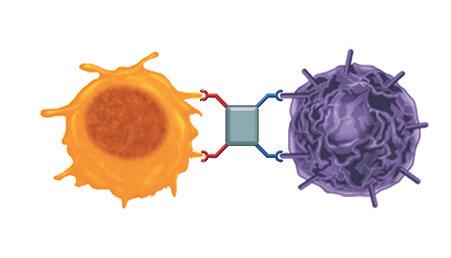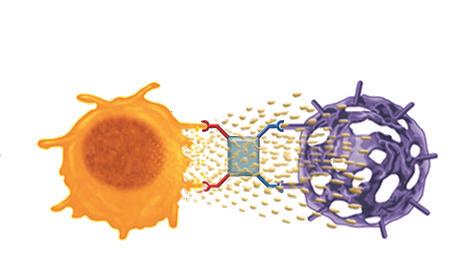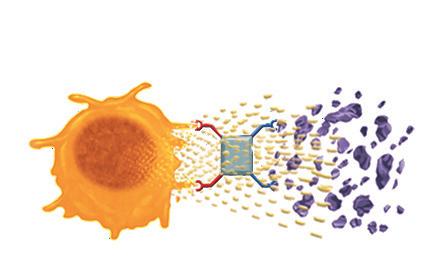
3 minute read
AGC Biologics
Name ›
Address/P.O. Box › Postal Code/City › Country › Additional office › Contact Person › Telephone › Fax › Email › Website › Social Media › Number of Employees › Founded (year) ›
Areas of Activity ›
External ›
Collaborations Affimed
Im Neuenheimer Feld 582 68120 Heidelberg Germany New York City, US Dr Angela Sickmann +49-6221-6743672 +49-6221-6743649 a.sickmann@affimed.com www.affimed.com
LI
150 2000
Immuno-Oncology
| Artiva | GHSG (Deutsche Hodgkin Studiengruppe) | Genentech | Leukemia and Lymphoma Society | MSD (Merck & Co.) | NKGen Biotech | Roche | Roivant | The University of Texas, MD Anderson Cancer Center
Affimed – engaging innate immune cells to fight cancer
Affimed (Nasdaq: AFMD) engineers targeted innate immunotherapies, seeking to cure patients by giving them back their innate ability to fight cancer. We are developing mono- and combination therapies to treat hematologic and solid tumours.
Our approach
Although the human immune system is normally capable of recognising foreign or aberrant cells, cancer cells have acquired highly effective ways to escape immune surveillance. As a result, immune cells such as NK cells and macrophages, which are part of the innate immune system (the first line of defence) cannot recognise tumour cells as foreign or aberrant and therefore cannot fight them.
To overcome these limitations, we develop antibodies that activate innate immune cells and redirect them to the tumour, thereby disabling the tumour’s evasion mechanisms. They establish a bridge between either NK cells or macrophages and cancer cells, triggering an immune response that leads to the destruction of tumour cells.
Our ROCK® platform
Leveraging our modular and versatile ROCK® (Redirected Optimised Cell Killing) platform, we generate proprietary, next-generation multi-specific antibodies. Our tetravalent (four binding sites), bispecific (two targets) innate cell engagers (ICE® formats) have the ability to bring NK cells or macrophages into proximity to cancer cells and trigger a signal cascade that leads to the destruction of these cancer cells. A number of clinical and preclinical programmes are in development based on the ROCK® platform and our ICE® molecules have shown a favourable safety profile and promising signs of therapeutic efficacy.
Our modular ROCK® platform with its versatile features enables the generation of multi-specific antibodies with appropriate properties for tailored treatment including halflife, tissue distribution, and optimal tumour and immune cell targeting. This allows us to tailor our innate cell engagers to specific indications and patient settings.
Targeted tumour cell killing via innate immune cell engagement
innate cell Tumour

Engager Therapy
Release of Perforins and Granzymes

Tumour Cell Lysis

Our product candidates
AFM13 Innate cell target: CD16A Tumour target: CD30
AFM13 is our lead product candidate and engages NK cells and macrophages. It is designed to treat CD30-positive malignancies including peripheral Tcell lymphoma (PTCL) and Hodgkin lymphoma (HL). A registration-directed Phase 2 study (REDIRECT) with AFM13 as monotherapy in relapsed or refractory patients with CD30-positive peripheral T-cell lymphoma or transformed mycosis is ongoing.
In addition, AFM13 is investigated in a phase 1 combination study with adoptive NK cells.
AFM24 Innate cell target: CD16A Tumour target: EGFR
AFM24 binds to the EGFR, which is constitutively active in many solid tumors. AFM24 has demonstrated the killing of tumour cells independent of their mutational status (e.g. Ras) and is currently investigated in a Phase 1 study. Phase 1 clinical studies with the combination of AFM24 and adoptive NK cells as well as with Roche’s atezolizumab have been initiated.’
AFM28 Innate cell target: CD16A Tumour target: CD123
AFM28 is in development for acute myeloid leukemia and myelodysplastic syndrome. Preclinical data show promising lysis of CD123-positive leukemic blasts and leukemic stem cells. A phase 1 study with AFM28 is in preparation.
AFM32 AFM32 is in preclinical development and the tumour target has not yet been disclosed. The program is partnered.










